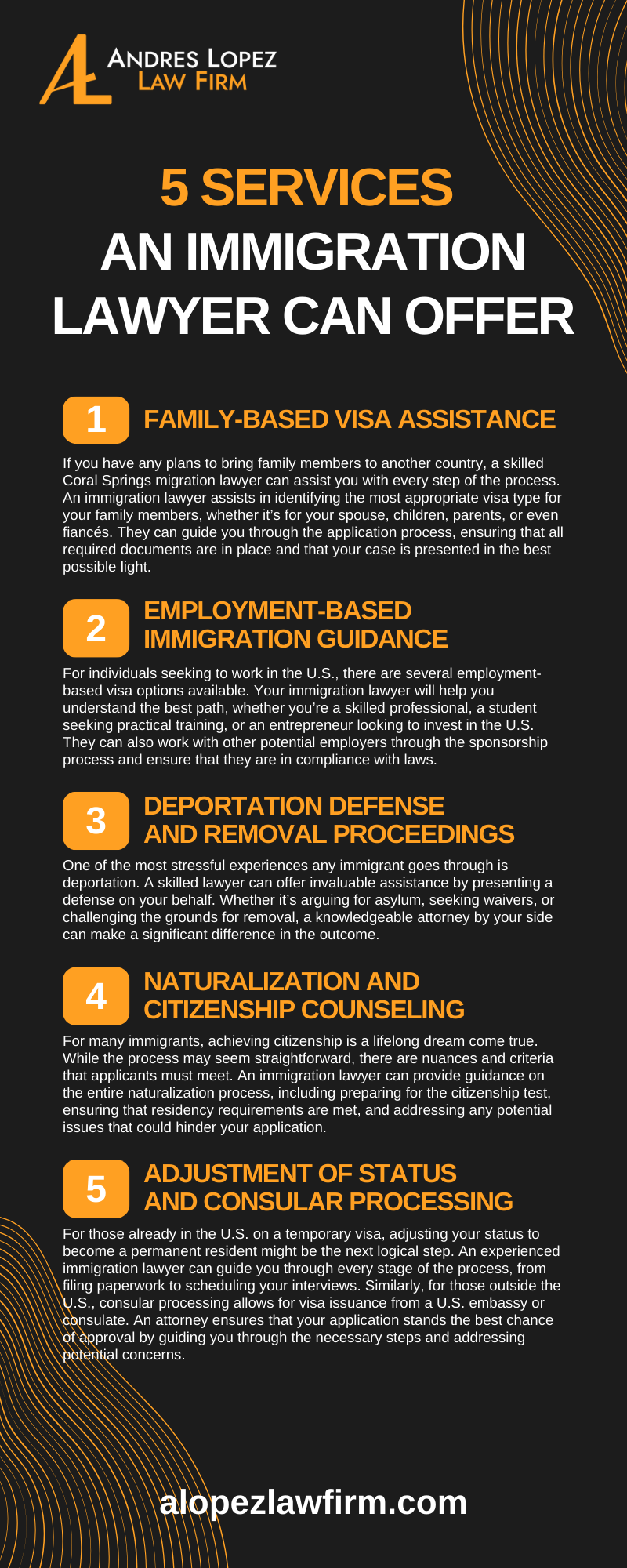Immigration Lawyer Coral Springs, FL
Traveling within the United States can be a stressful experience for anything, but as a Coral Springs, FL immigration lawyer knows, it’s particularly overwhelming for those who are undocumented. If you are considering traveling with or without DACA and want to know how to do so carefully, read on. But keep in mind that the best way to protect your best interests is to have a lawyer to represent you in case something goes awry. A lawyer from The Andres Lopez Law Firm is ready to intervene and come to your aid if an immigration related issue arises.
Table Of Contents
- Domestic Flights
- Ground Transportation
- Types Of Visas
- 5 Services An Immigration Lawyer Can Offer
- Immigration Infographic
- FAQs On Immigration Law
Domestic Flights
Trying to get around by domestic flight can cause anxiety for many immigrants, especially if they are undocumented. If you have questions or concerns about traveling by plane to where you need to be, consider getting advice from us first before proceeding. Traveling by flight domestically means you will have to present an unexpired and valid photo ID that has been issued by the federal or state government. As a Coral Springs immigration lawyer explains, those who are undocumented may use any of the following as a form of identification that is accepted by TSA:
- Border-crossing cards
- State photo identity card
- Military ID
- U.S. Citizenship and Immigration Service Employment Authorization Card
- Trusted traveler cards issued by Department of Homeland Security (DHS): FAST, NEXUS, or SENTRI
- Airport or airline photo ID cards that are in compliance with regulations set by TSA and transportation worker credential ID
- State driver’s license
- Foreign passport (not expired)
- Native American tribal ID cards
Ground Transportation
In recent years, there have been numerous reports that Border Patrol agents are doing immigration checks without warrants on those riding by train or bus. While Customs Border Patrol (CBP) has said publicly that their agents are not allowed to board ground transportation and question passengers without consent or warrants, it is important to be aware of what your rights are if this does happen to you. Having a lawyer to call immediately just in case can make all the difference in how such a situation gets handled. Here are tips to consider if you take a ride on a bus or train:
- You have a right to stay silent.
- If in doubt, refuse to answer questions about the status of your immigration or citizenship.
- Do not sign documentation without help from a lawyer first.
- Do not lie, and do not guess when answering questions, saying nothing is usually better.
- Never attempt to show false documentation, but if you have valid immigration paperwork, provide them.
- You can decline a search of your belongings or self by stating you do not consent to a search.
- You have the right to film video of your interactions with immigration agents.
- If you are searched or stopped, you have the right to request the officer’s name and/or badge ID number.
Call A Lawyer For Help
If you need help regarding an immigration related issue or concern, don’t hesitate to contact a Coral Springs immigration lawyer as soon as you are able. The team at The Andres Lopez Law Firm has handled many cases in the past probably very similar to yours, and is able to come to your aid right away.
A skilled Coral Springs, FL immigration lawyer can provide a wide range of legal services for any individual who wishes to move to a new country for a fresh start. These legal professionals possess specialized knowledge in immigration law and offer services that include legal advice, document preparation, and representation before immigration authorities. Whether it’s understanding the intricacies of the immigration system, ensuring the accuracy and completeness of application materials, or navigating complex legal issues, immigration lawyers play a crucial role in guiding individuals through the complexities of immigration procedures.
Types Of Visas
When it comes to visas, there are various types available depending on the purpose of the visit. There are many categories of visas a person can apply for depending on the intended purpose of a visit. For those planning a leisure or recreational trip, a tourist visa, also known as a visitor visa, is the appropriate choice. These visas grant individuals permission to visit a country for a specific period, typically for leisure or tourism purposes. Student visas, on the other hand, are designed for individuals seeking to pursue education in a foreign country. These visas often require proof of admission to an educational institution, financial resources, and health insurance coverage.
As a Coral Springs immigration lawyer can explain, work visas are for individuals who have obtained a job in another country. Each country may have specific requirements related to the applicant’s skills, qualifications, and the sponsorship provided by the employer. Family-based visas allow eligible family members of citizens or permanent residents to join them in the destination country. The eligibility criteria and sponsorship requirements for these visas may vary depending on the relationship and the immigration laws of the country in question.
Applicants must follow several steps as part of their visa application process. The process typically begins with thorough research into the visa requirements of the destination country. This includes understanding the application forms, supporting documents, and any additional requirements. The next step involves completing the visa application accurately and providing all necessary supporting documents, such as a valid passport, proof of financial resources, travel itinerary, and accommodation details. Some countries may require a visa interview and the collection of biometric data as part of the application process. It is essential to adequately prepare for the interview by reviewing the application and supporting documents. After the application is submitted, the visa processing time can vary. Applying well in advance of planned travel dates is recommended to account for potential processing delays.
Immigration Timeline
The immigration timeline varies and depends on a large number of different factors. The process can range from a few weeks to several months or even years. It is crucial to plan ahead, gather all required documents, and follow the guidelines provided by the immigration authorities to avoid unnecessary delays or complications.
Set Up A Consultation
It is advisable to consult an immigration lawyer in cases involving complex immigration situations, legal issues, prior visa denials, criminal history, potential inadmissibility, or when seeking employer sponsorship for work visas. Their expertise can provide valuable guidance and ensure a smooth navigation through the immigration process. Learn more details about what type of legal services a trusted Coral Springs immigration lawyer like one from The Andres Lopez Law Firm can provide you.
5 Services An Immigration Lawyer Can Offer
Experienced Coral Springs, FL immigration lawyers know that immigration law is far from a straightforward practice area. Whether you’re seeking to immigrate, bring family members over, or need assistance with visa issues, an expert’s guidance can streamline the process and increase the chances of success. At The Andres Lopez Law Firm, we recognize that every individual’s situation is unique. Below are five essential services that a proficient Coral Springs immigration lawyer can offer:
Family-Based Visa Assistance
If you have any plans to bring family members to another country, a skilled Coral Springs migration lawyer can assist you with every step of the process. An immigration lawyer assists in identifying the most appropriate visa type for your family members, whether it’s for your spouse, children, parents, or even fiancés. They can guide you through the application process, ensuring that all required documents are in place and that your case is presented in the best possible light.
Employment-Based Immigration Guidance
For individuals seeking to work in the U.S., there are several employment-based visa options available. Your immigration lawyer will help you understand the best path, whether you’re a skilled professional, a student seeking practical training, or an entrepreneur looking to invest in the U.S. They can also work with other potential employers through the sponsorship process and ensure that they are in compliance with laws.
Deportation Defense And Removal Proceedings
One of the most stressful experiences any immigrant goes through is deportation. A skilled lawyer can offer invaluable assistance by presenting a defense on your behalf. Whether it’s arguing for asylum, seeking waivers, or challenging the grounds for removal, a knowledgeable attorney by your side can make a significant difference in the outcome.
Naturalization And Citizenship Counseling
For many immigrants, achieving citizenship is a lifelong dream come true. While the process may seem straightforward, there are nuances and criteria that applicants must meet. An immigration lawyer can provide guidance on the entire naturalization process, including preparing for the citizenship test, ensuring that residency requirements are met, and addressing any potential issues that could hinder your application.
Adjustment Of Status And Consular Processing
For those already in the U.S. on a temporary visa, adjusting your status to become a permanent resident might be the next logical step. An experienced immigration lawyer can guide you through every stage of the process, from filing paperwork to scheduling your interviews. Similarly, for those outside the U.S., consular processing allows for visa issuance from a U.S. embassy or consulate. An attorney ensures that your application stands the best chance of approval by guiding you through the necessary steps and addressing potential concerns.
Request Legal Assistance
Choosing the right Coral Springs immigration lawyer can make all the difference in your immigration journey. The Andres Lopez Law Firm is dedicated to providing comprehensive immigration services tailored to each client’s individual needs. We strive to offer expert guidance and compassionate support at every step of the process. Looking for assistance with your immigration needs? Don’t hesitate to reach out to us today for a consultation. Contact a competent and dedicated Coral Springs, FL immigration lawyer near you so that you can get the legal counsel you need.
Immigration Infographic
Coral Springs Immigration Law Statistics
According to statistics from the Pew Research Center, the U.S. foreign-born population recently reached a record 46.1 million and accounts for almost 15 percent of the nation’s population. Growth accelerated after Congress made U.S. immigration laws more permissive in 1965. In 1970, the number of immigrants living in the U.S. was less than a quarter of what it is today.
If you have immigration law questions, call our office for legal assistance.
6 Steps In The Immigration Process
Bringing family together is one of the most important goals in U.S. immigration law. If you’re looking to help a spouse, child, or parent come to the United States, the process starts with the right legal steps. A clear understanding of how each phase works makes a real difference in timing and outcome. At The Andres Lopez Law Firm, we help people make informed decisions about family immigration every day.
If you’re planning to file for a family member from abroad or within the country, it’s helpful to know how the process works from beginning to end. Here’s what you should expect at each stage.
Confirm Qualifying Relationship And Immigration Category
The first step is verifying that the petitioner has a qualifying family relationship with the person they want to bring to the U.S. U.S. citizens can petition for immediate relatives such as spouses, unmarried children under 21, and parents. Lawful permanent residents are limited to spouses and unmarried children. Each group has a different priority and visa availability, so it’s important to begin in the right category.
Submit Form I-130 To USCIS
Form I-130 (Petition for Alien Relative) is the main form used to request immigration benefits for family members. This form is filed with supporting documentation that proves the relationship—such as marriage certificates, birth certificates, and other records. Accurate and complete submissions help avoid Requests for Evidence (RFEs) and long delays.
Wait For Petition Review And Visa Number Assignment
After filing, USCIS processes the petition. For immediate relatives of U.S. citizens, there’s no wait for a visa number, but for other family-based categories, the Department of State assigns visa numbers based on preference categories and country caps. This step often takes months or even years depending on the backlog.
Move Forward With Consular Or Adjustment Process
Once a visa number becomes available, the next steps depend on whether the family member is inside or outside the U.S. If abroad, they’ll attend a consular interview. If they’re in the U.S. and eligible, they may apply to adjust status using Form I-485. Each route requires additional forms and supporting materials, such as medical exams and identification records.
Submit Financial Sponsorship Forms
To sponsor a family member, the petitioner must show financial ability to support them. Form I-864 (Affidavit of Support) is used to prove that the petitioner meets income requirements. Documents like recent tax returns, pay stubs, or a letter from an employer are typically required. This part is critical because an insufficient affidavit can delay or block approval.
Attend The Final Interview And Receive Decision
The last step involves an interview, either with USCIS or at a U.S. consulate. The officer will review documents, ask questions to confirm the relationship, and determine admissibility. If approved, the family member receives either a visa or a green card. This stage may also involve fingerprinting and additional background checks.
Each part of this process requires careful attention and timely action. Whether you’re just starting or are already partway through, working with our trusted Coral Springs, FL alien relative and family of U.S. Citizens immigration lawyer can help avoid missteps and unnecessary delays.
At The Andres Lopez Law Firm, we’re committed to helping families move forward with confidence. If you’re ready to begin or have questions about your current situation, contact us today to schedule a consultation. We’re here to help your family take the next step.
FAQs On Immigration Law
When you need help, reach out to our trusted Coral Springs, FL immigration lawyer
How Can An Immigration Lawyer Assist Me With My Immigration Case In Florida?
An immigration lawyer can provide invaluable assistance in navigating the complex legal landscape of immigration in Florida. They are well-versed in the ever-changing immigration laws, regulations, and procedures. Whether you are seeking a visa, green card, or facing deportation, an experienced immigration attorney can offer expert guidance, ensure your paperwork is complete and accurate, and advocate for your rights and interests throughout the process. An immigration lawyer’s primary role is to help individuals and families with immigration-related matters.
What Are The Benefits Of Hiring An Immigration Lawyer In Florida?
Hiring an immigration lawyer offers numerous advantages. First and foremost, they possess in-depth knowledge of immigration laws and policies specific to the state, allowing them to provide tailored guidance. Additionally, they can help you avoid costly mistakes and delays by ensuring that your application is complete, accurate, and submitted on time. Furthermore, an attorney can represent you in immigration court proceedings, offering a strong defense and increasing the likelihood of a favorable outcome. An attorney’s guidance can streamline the process and maximize your chances of achieving your immigration goals.
What Types Of Immigration Cases Does A Coral Springs Immigration Lawyer Handle?
Immigration lawyers in Florida handle a wide range of immigration cases, including family-based immigration, employment-based immigration, deportation defense, asylum and refugee cases, visa applications, green card applications, and more. They can assist clients with diverse immigration needs, ensuring they receive the appropriate legal representation and guidance for their specific situation. Their expertise spans the full spectrum of immigration matters, allowing them to assist clients in achieving their unique immigration goals.
How Can I Schedule A Consultation With An Immigration Lawyer In Florida?
Scheduling a consultation with an immigration lawyer is a straightforward process. You can typically contact the law firm directly via phone or email to request a consultation. During the consultation, you will have the opportunity to discuss your immigration concerns, goals, and potential legal strategies. It’s an essential first step in receiving personalized guidance and understanding how an attorney can assist you.
What Should I Bring To My Initial Consultation With An Immigration Lawyer In Florida?
To make the most of your initial consultation with an immigration lawyer in Florida, it’s advisable to come prepared. Bring any relevant documents related to your immigration case, such as passports, visas, marriage certificates, employment records, and any correspondence with immigration authorities. Providing a detailed account of your situation and any specific concerns will also help the attorney assess your case more effectively.
Finding Help For Your Immigration Case Today
Ready to explore your immigration options in Florida? Contact The Andres Lopez Law Firm today to schedule a consultation with our experienced immigration attorneys. We are here to provide you with expert guidance and dedicated support throughout your immigration journey. For help now, reach out to our Coral Springs immigration lawyer for help.

Trial Attorney
Attorney Andres Lopez has over a decade of trial experience. In that time, his work and track record of success has earned him a reputation for being a top trial attorney in South Florida.
Born in La Paz, Bolivia, Andres Lopez and his family moved to Washington, D.C. when he was a child.
Prior to attending law school, Andres Lopez tirelessly worked to give a voice to the people by serving in the White House, the Maryland Governor’s Office and managing the campaign of the first Latino to be elected to public office in Maryland.
Devoted to the legal community, Mr. Lopez serves as a member of The Florida Bar, the Broward County Bar Association, the Broward County Hispanic Bar Association, the Maryland Bar Association and the Florida Justice Association.






